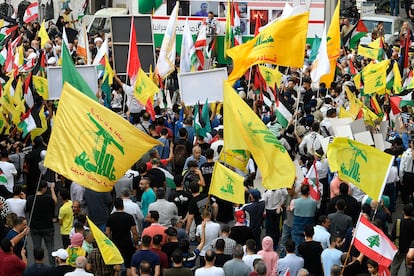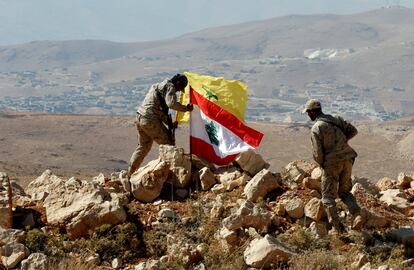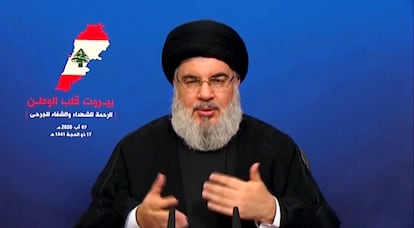What is Hezbollah and what’s its role in the Israel-Hamas conflict
Israel has launched strikes against Hezbollah sites in response to attacks from the militant group

Hezbollah, the Lebanese political and militant group, has recently become a significant part of discussions surrounding the Israeli-Palestinian conflict. As Israeli troops move south into Gaza with the objective of destroying Hamas, in Israel’s northern border region, its forces have been engaged for weeks with Hezbollah, which is considered an ally of Hamas.
Although the group has previously fought with Israel and supported the Palestinians, it is currently hesitant to become involved in a full-scale war. It appears that Hezbollah wishes to avoid a domestic crisis. Here’s an overview of the organization.
What is Hezbollah?
Hezbollah is a Shia Islamist political and militant group based in Lebanon. Shia Islamism is a political and social ideology rooted in Shia Islam, combining religious beliefs with political activism and advocating for the application of Islamic laws and principles in governance and society. The name Hezbollah translates to “Party of God” in Arabic.
Hezbollah was established in 1982 to combat the Israeli invasion of Lebanon, which resulted in the Lebanon War. The organization was founded by followers of Ayatollah Khomeini, the leader of the Iranian Revolution and founder of the Islamic Republic of Iran, which provided funding to the group. Its forces were trained and organized by the Iranian Revolutionary Guards. There have been reports that the Islamic Jihad Organization was a precursor to the group.
The organization’s primary focus was ending Israel’s occupation of southern Lebanon following the invasion and siege of Beirut. Later, it played a crucial role during the Lebanese Civil War, opposing American forces and the Amal movement, as well as Syria during the War of the Camps (1985-1988). While Hezbollah employed conventional military tactics and weaponry, it is credited with being one of the first resistance groups to use tactics like suicide bombings and capturing foreign soldiers. At the end of the Civil War in 1990, Syria, which controlled Lebanon at the time, allowed the group to maintain control of Shia areas along the border with Israel.

From 1985 to 2000, Hezbollah participated in the 1985-2000 South Lebanon conflict against the South Lebanon Army and the Israel Defense Forces (IDF). The group clashed again with the IDF in the 2006 Lebanon War.
In the 1990s, Hezbollah transitioned into a political group and decided to participate in the 1992 elections. Ali Khamenei, the supreme leader of Iran, supported this decision. Since then, Hezbollah has been actively involved in Lebanese politics, gaining more power. Today, it enjoys strong support among Lebanese Shia Muslims, while Sunnis disagree with its agenda and methods.
Reports indicate that since 2006, the group’s military strength has significantly increased, with its paramilitary wing becoming more powerful than the Lebanese army. In August 2008, its cabinet unanimously approved a policy statement guaranteeing Hezbollah’s right to “liberate or recover occupied lands.”
Hezbollah was involved in the Syrian civil war, joining the Syrian government against the Syrian opposition. Between 2013 and 2015, it trained local militias in Syria and Iraq to combat the Islamic State.
Currently, the group continues to receive military training, weapons, and funding from Iran, along with political support from Syria, although its influence in that country has waned since the civil war. In 2021, Sayyed Hassan Nasrallah, the leader of the organization, stated that the group had 100,000 fighters.

Hezbollah as a terrorist organization
Several countries, including the European Union, the United States, and most members of the Arab League, except Lebanon and Iraq, have designated Hezbollah as a terrorist organization. China remains neutral and maintains contacts with Hezbollah, while Russia considers it a legitimate sociopolitical organization.
Hezbollah and Israel
One of Hezbollah’s primary goals, as outlined in its 1985 manifesto, is the elimination of the state of Israel. Naim Qassem, the group’s second-in-command, has stated that the struggle against Israel is a core belief of Hezbollah and the central rationale for its existence. Hezbollah considers Israel to be an illegitimate state.
Although Hezbollah officials have claimed that the group is only “anti-Zionist” and not anti-Semitic, some reports have found that the organization spreads anti-Semitic conspiracy theories.
Who funds Hezbollah?
Multiple reports suggest that Hezbollah’s funding comes from the Iranian government, Lebanese business groups, businessmen, other Islamic groups, and taxes paid by Shia Lebanese. The group claims that its main source of income comes from its own investment portfolios and donations by Muslims. Western sources indicate that Syria also provides aid to the group. There are also allegations that Qatar, North Korea, Nicaragua, and Cuba support Hezbollah to different degrees, but none of these have been confirmed.
Sign up for our weekly newsletter to get more English-language news coverage from EL PAÍS USA Edition
Tu suscripción se está usando en otro dispositivo
¿Quieres añadir otro usuario a tu suscripción?
Si continúas leyendo en este dispositivo, no se podrá leer en el otro.
FlechaTu suscripción se está usando en otro dispositivo y solo puedes acceder a EL PAÍS desde un dispositivo a la vez.
Si quieres compartir tu cuenta, cambia tu suscripción a la modalidad Premium, así podrás añadir otro usuario. Cada uno accederá con su propia cuenta de email, lo que os permitirá personalizar vuestra experiencia en EL PAÍS.
¿Tienes una suscripción de empresa? Accede aquí para contratar más cuentas.
En el caso de no saber quién está usando tu cuenta, te recomendamos cambiar tu contraseña aquí.
Si decides continuar compartiendo tu cuenta, este mensaje se mostrará en tu dispositivo y en el de la otra persona que está usando tu cuenta de forma indefinida, afectando a tu experiencia de lectura. Puedes consultar aquí los términos y condiciones de la suscripción digital.









































